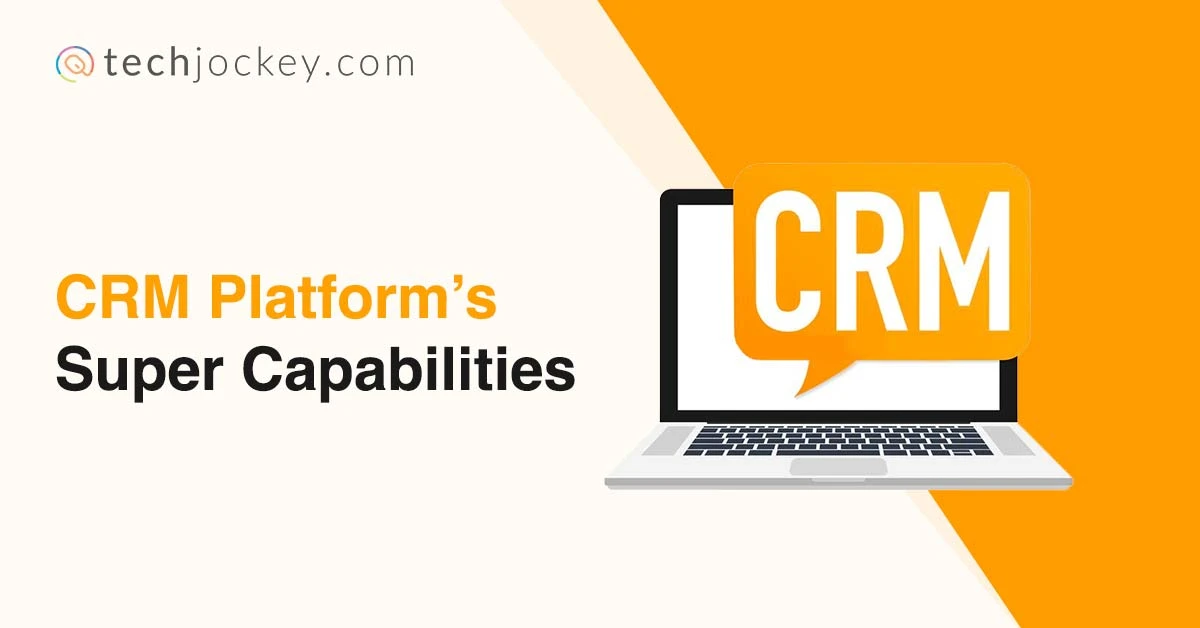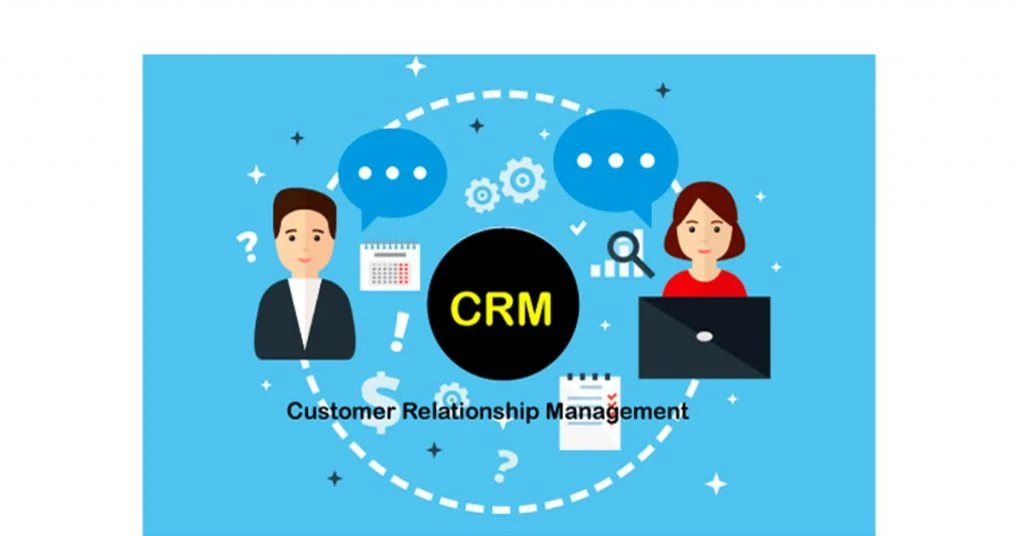What are the Key Capabilities of CRM Platforms?

Many large enterprises are thriving on CRM software because it opens up loads of amazing opportunities. It makes the process of managing leads, prospects, and clients more effectively than ever. Let’s find out what are the key capabilities of CRM platforms which became an essential part of business growth strategies.
Dealing with clients every day can be a challenging task. Keeping in touch regularly, diagnosing problems, delivering the best feasible solution, and having positive interactions may feel like a load of tasks, which you cannot afford to miss even once. Hence, to give your shoulders some support, you can invest in customer relationship management software.

What is CRM Software?
Customer relationship management software helps small, medium, as well as large enterprises, acquire, retain and nurture customer relationships. It merges all the details of customers into a single repository.
CRM software helps with more than just managing customer data. It has features that, if used effectively, can help segment prospects and nurture them with targeted messaging. CRM software further helps in streamlining the sales funnel and maintaining customer loyalty. It eventually saves a lot of time and money with marketing and sales automation.
Why Do You Need CRM Software?
CRM software incorporates organizational processes across sales and marketing with its unique feature and functions that strategically serve as a key initiative across departments.
It offers three major benefits to business:
- Streamlines customer data: CRM makes customer data easily searchable so that there’s no place for confusion or misinformation during meetings. It allows you to sync information in different devices so that everyone is aware of the current piece of information.
- Automate Processes: The software lets users standardize processes and workflows related to sales and marketing. The streamlined process enhances coordination among teams.
- Provides actionable insights about business strategy and customer behavior: The software supports analytical functions so that managers can create reports and personalized customer data. These reports help to track revenue, customer segmentation, and manage successful campaigns.
Suggested Read: List of 14 Best CRM Software for Small Businesses in India
How Does a CRM Platform Work?

Generating qualified leads is of utmost importance for a company. CRM software tracks different actions of a customer via emails, social media, media channels, and stores their buying history and preferences. These customer details help sales professionals create a personalized sales pipeline and facilitate a higher conversion.
CRM solutions play an important role in managing SMS and email campaigns and automating sales follow-ups. You can set reminders for follow-ups and also refer to customer notes to ensure customized services. You can track and manage the performance of both your in-house and field sales teams with CRM solutions.
Suggested Read: 15 Best Real Estate CRM Software for Real Estate Developers in India | What Is Analytical CRM: A Complete Guide to Its Types, Benefits & Features
What Does a CRM System Do?
Many small businesses struggle to store data on spreadsheets, sticky notes, emails, etc. It’s scattered data that they cannot keep up with at crucial times. In this case, CRM becomes a savior.
The core function of any CRM, be it cloud-based or on-premise software on your server, is contact management. It allows you to store and manage data for the entire customer lifecycle. Each field can be customized, tweaked, updated, and filtered based on your needs.
Using a CRM, you can track and manage every possible information, and perform other tasks like:
- Creating customer personas
- Lead scoring based on triggers
- Lead nurturing
- Sales pipeline management
- Email/SMS campaigns
- Territory management
- Opportunities management
- Reporting & analytics
The more data you feed on your CRM about prospects and customers, the more value it will deliver with the help of AI technologies.
10 Most Important Key Capabilities of CRM Platforms
Let’s dive deep into the key capabilities of CRM solutions.
- Sales Performance Management: The software offers a bunch of benefits to the sales team. It’s crucial for sales managers to monitor the performance of team members. Managers can figure out bottlenecks in the performance of sales professionals and empower them for better results.
- Track Past Customer Conversations: CRM lets you access the conversation history with any customer with a click. When any client calls you asking for support, any representative can quickly access the conversation history and provide the best support.
- Lead Management– CRM helps in determining the quality of leads. It manages the process of turning prospects into potential customers by identifying, nurturing, scoring, and updating the sales pipeline. The technology allows businesses to identify hot leads based on psychographic and demographic factors. It enhances the productivity and effectiveness of the sales team by keeping their focus at the right place at the right time.
- Marketing Campaign Management: This special feature of CRM allows you to plan and executive your entire marketing campaign through a centralized user interface. It includes ROI management, performance analysis, and more. CRM incorporates analytical tools along with data management capabilities for better market analysis.
- Customer Service Management: As the name suggests, it helps manage the customer service team’s performance. Users can track, manage and re-open any customer query anytime and anywhere. Additionally, it also allows you to deliver automated client service in a personalized manner. You can create a knowledge base for customer self-service.
- Contact Management: It’s one of the most crucial elements of CRM. It allows you to segment your contacts into multiple groups to cater to their needs specifically. It helps strengthen marketing strategies when you’re introducing any new product/service. You can run targeted campaigns and address specific pain points of every segment of prospects.
- Workflow Automation: CRM offers one of the best solutions for automating workflows and increasing efficiency. It ensures process optimization by automating various business processes like data collection, data analysis, planning, marketing, and sales force management.
- Business Intelligence Tools: Business Intelligence tools (BI) allows users to view statistics and reports through a centralized dashboard. It provides real-time data updates that can be accessed at any point for decision-making.
- Chat Integration: With CRM, you can also integrate third-party tools like chatbots. As a result, you can track and manage queries generated through chat platforms.
- Case Management: This is an online feature that allows managers to keep confidential data secure. It protects customers’ data from misuse or any other cyber threat.
Key Takeaways:
Customer relationship management software is an effective platform that scales with your needs. It has multiple features that can enhance the working capabilities of the small, medium as well as large enterprises.
Suggested Read: 7 Warning Signs Your Company Needs CRM Software | What is Operational CRM: Uses, Benefits, Features
FAQs:
What are the major CRM strategic capabilities?
CRM software provides many capabilities for managing sales performance, tracking past customer conversations, managing leads, enhancing customer service, and handling marketing campaigns.
What are the important features of CRM platforms?
CRM software comes with some amazing set of features, like:
1. Sales and Marketing Automation
2. E-commerce and payment
3. Email marketing
4. Reporting and analysis
5. Sales pipeline management
6. Appointments, and many more.What are the major capabilities of CRM platforms?
CRM software provides the following capabilities:
1. Customised view of information
2. Intuitive interface
3. Calendar and activity management
4. Workflow and process automation
5. Easy implementation
6. Skill training and knowledge transfer
7. Application integration
8. Lookup, Folders, Filters and Grouping, etc
The Techjockey content team is a passionate group of writers and editors dedicated to helping businesses make informed software buying decisions. We have a deep understanding of the Indian software market and the challenges that businesses face when choosing the right software for their needs. We are committed... Read more





























